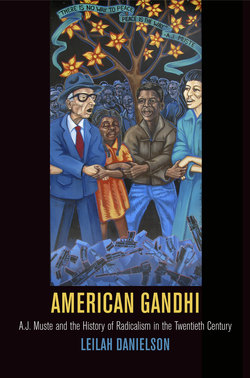American Gandhi

Реклама. ООО «ЛитРес», ИНН: 7719571260.
Оглавление
Leilah Danielson. American Gandhi
Отрывок из книги
American Gandhi
Series Editors:
.....
This was how Muste became a cultural and political icon in the 1960s. Bohemian radicals and Freudian psychoanalysts viewed him as a model of the self-actualized personality, delighting in his advocacy of authenticity, spontaneity, and love. Intellectuals dialogued with him about the problems of conformity and organization in contemporary American society, and admired his ability to take the existential leap of faith and action that eluded them. Liberal Protestants increasingly found his critique of realism persuasive, and joined him in signing petitions and marching in demonstrations against nuclear testing and the Vietnam War. Civil rights activists praised him for his pioneering efforts on behalf of nonviolence; as Martin Luther King Jr. told Muste’s biographer, the jazz critic Nat Hentoff, ‘‘The current emphasis on nonviolent direct action in the race relations field is due more to A. J. than to anyone else in the country.’’64
Pacifists, meanwhile, continued to draw strength and sustenance from what they viewed as his equanimity, expressed through joyfulness and humor, as well as his spiritual constancy and depth of vision. ‘‘We are all sons of A. J.,’’ Tom Cornell of the Catholic Worker Movement proclaimed.65 Muste was ‘‘the leader, prophet, confessor and gadfly to us all,’’ recalled Glenn Smiley.66 Without Muste’s leadership, antiwar activists concurred, the coalition against the war in Vietnam would not have been possible. Activists outside of the United States similarly recognized Muste’s centrality to struggles for peace and freedom; Indian pacifists referred to him as ‘‘the American Gandhi,’’ and when he died, telegrams streamed in from around the world, from places as diverse as Tanzania, India, North Vietnam, England, France, and Chile.67
.....